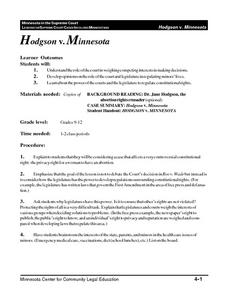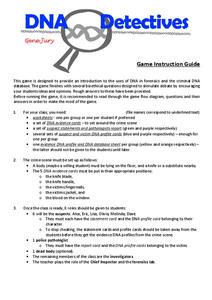ConnectED
Crime Scene Investigation
How exactly does a crime scene investigation work? The resource, a unit on criminology, covers everything from the deductive reasoning skills needed for detectives to DNA fingerprinting, all the way to how to gather evidence and bring...
Curated OER
Science in the Court Room
Share their opinions on the use of DNA databases in criminal investigations. After reading an article, they evaluate the pros and cons of the databases and work in groups to answer discussion questions. They write a letter to a state...
School Improvement in Maryland
Court Proceedings Civil Cases
What's the difference between civil and criminal law? How do the court proceedings differ in these two types of trials? How do the standards of proof differ? Why do these differences exist? As part of their examination of the...
Curated OER
Crime Time
Young scholars examine fundamentals of American criminal justice by analyzing each step of the criminal process. They follow the process of a well-known or publicized criminal case in The New York Times, and keep a journal of its...
Curated OER
Crime and Justice
Students investigate what happens when someone is arrested. They engage in a mock trial role play about a burglary. They engage in the process of the Criminal Justice System from arrest to sentencing.
PBS
Using Primary Sources: The Rogue's Gallery
What would be in your life's scrapbook? Scholars use short video clips, primary and secondary documents, and photos to investigate a 1909 scrapbook. They analyze and uncover what the Rogue Book tells them about the past in Western...
Curated OER
Riot, Revolution and Reform
Learners examine the student protests and subsequent massacre at Tiananmen Square in 1989 and the current petition by victims' family members to open a criminal investigation of the responsible officials.
Curated OER
Hodgson v. Minnesota
Students investigate the role of and develop opinions of the court in weighing competing interests in making decisions. They examine the power of the courts and legislature to regulate constitutional rights.
Curated OER
The Youth Criminal Justice Act
Pupils review the Youth Criminal Justice Act and examine the consequences for young people who commit crimes. They investigate the rehabilitation and reintegration processes associated with the act.
Curated OER
Criminal Activities
Students investigate Justice Week in Britain. In this current events lesson, students visit selected websites related to law and order in the U.K. Students may create their own anti-social art as a culminating activity.
Curated OER
the International Criminal Court's History And Uses
Students analyze and come to explain the history behind the formation of the International Criminal Court, along with the recent controversy facing the Court; and current crises that warrant the Court's attention.
American Documentary
The Benefits and Drawbacks of Plea Bargains
The outcome of 90 percent of criminal cases in the US is determined by plea bargains. Clips from the documentary Better This World create the backdrop for an investigation of the benefits and drawbacks of the plea bargaining process....
Curated OER
Pressing Cases
Students investigate famous criminal cases in which the media has played a significant role and reflect on how the news helps to shape attitudes and behaviors in their own lives.
Curated OER
Children's Accountability for Their Crimes
Learners participate in a round-table discussion about the juvenile justice system and investigate the 'age of accountability' debate. They write a persuasive essay supporting or refuting the punishment received by the children discussed...
Curated OER
Meting Out Justice
Students investigate the murder case of Emmett Till and identify the missing pieces from the case. Through research, they then work to fill in the gaps to create a basis for examining how justice might be served anew in this...
Gene Jury
DNA Detectives
Police find a man murdered in a local hotel, DNA everywhere, and now they need scholars' help. Budding detectives step into a crime scene playing the roles of victim, suspects, and investigators. They apply knowledge of criminology and...
Curated OER
Justice
Students consider the role of justice in the formation of the United States and in the operation of today's criminal justice system. They investigate symbols associated with justice and references to justice in the Constitution.
Curated OER
Parental Accountability and Public Policy
Students investigate parental responsibility for the actions of their Students. They compare the responsibility in the State of Washington and the rest of the country.
Curated OER
You and the Judicial System
High schoolers explore how the structure of the state and federal judicial systems affect them. They select an appropriate media and create a presentation on the structure of the judicial system, the criminal judicial system and a guide...
Curated OER
Zen and the Art of Murder
Students describe the importance of citizen involvement in the judicial system. They play the role of a witness to a crime scene by watching the video clip. Students discuss how differing eyewitness accounts can affect a police...
Anti-Defamation League
Exploring Solutions to Address Radical Disparity Concerns
The deaths of Michael Brown, Eric Garner, and Tamir Rice, and the protests that followed the 2014 shootings, are the focus of a current-events activity that asks class members to brainstorm and research possible strategies to address the...
Curated OER
The Ongoing Debate: Crime Control v. Due Process Protection
Students investigate the Exclusionary Rule and other ways of to enforce the protections found in the Bill of Rights. They study how effective criminal control and public safety is carried out while citizens Constitutional rights are...
Curated OER
Reporter Rights vs. Legal Access...
High schoolers explore cases that have occurred in the past in which reporters refuse to reveal their confidential conversations with government sources and investigate the status of the current bills in Congress. Students use this...
Curated OER
Search and Seizure: What Does It Mean?
Students, in a juvenile correctional facility, study the meaning of the Fourth Constitutional Amendment. They study definitions and complete worksheets to investigate the implications of the amendment.























